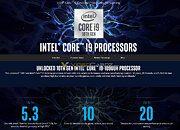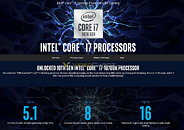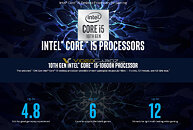- Joined
- Oct 9, 2007
- Messages
- 47,243 (7.55/day)
- Location
- Hyderabad, India
| System Name | RBMK-1000 |
|---|---|
| Processor | AMD Ryzen 7 5700G |
| Motherboard | ASUS ROG Strix B450-E Gaming |
| Cooling | DeepCool Gammax L240 V2 |
| Memory | 2x 8GB G.Skill Sniper X |
| Video Card(s) | Palit GeForce RTX 2080 SUPER GameRock |
| Storage | Western Digital Black NVMe 512GB |
| Display(s) | BenQ 1440p 60 Hz 27-inch |
| Case | Corsair Carbide 100R |
| Audio Device(s) | ASUS SupremeFX S1220A |
| Power Supply | Cooler Master MWE Gold 650W |
| Mouse | ASUS ROG Strix Impact |
| Keyboard | Gamdias Hermes E2 |
| Software | Windows 11 Pro |
Marketing materials of Intel's upcoming 10th generation Core "Comet Lake-S" desktop processors leaked to the web confirm the lineup's core-counts. The series will be led by 10-core/20-thread Core i9 processors, with Thermal Velocity Boost frequencies of up to 5.30 GHz. The Core i7 series will consist of 8-core/16-thread processors, with up to 5.10 GHz TVB frequencies. The Core i5 series gets its biggest shot in the arm, with the introduction of HyperThreading for the first time in 8 generations (the last Core i5 desktop processors with HTT were dual-core first-generation Core chips). The 10th gen Core i5 series chips are 6-core/12-thread, with clock-speeds running up to 4.80 GHz.
These frequencies should indicate two interesting things. One, that the Core i5-10600K will outperform the Core i7-8700K (6-core/12-thread, up to 4.70 GHz boost), resulting in a roughly 35% increase in price-performance vs. the i7-8700K, if it ends up being priced at $260. Two, that the Core i7-10700K will outperform the Core i9-9900K on virtue of 100 MHz higher frequencies, and give the segment a roughly 30% price-performance increase compared to the i9-9900K, if the i7-10700K ends up priced at $380. The Core i9-10900K will outperform the i9-9900K both in single- and multi-threaded fronts given its 300 MHz higher max boost and two extra cores (four extra threads), in what could be a roughly 25% price-performance gain, assuming an unchanged $500 price.



Intel's ability to price the i9-10900K north of $500 will be severely restricted by AMD's positioning of the Ryzen 9 3900X, given that the 12-core chip has sold for around $450 in more than one seasonal sale. A bill-of-materials analysis from February suggests that AMD has given itself "massive" cost-cutting headroom with its chiplet approach, and can aggressively cut prices of the 3900X to compete with the i9-10900K. The same goes for its Ryzen 7 3800X and Ryzen 5 3600X.
View at TechPowerUp Main Site
These frequencies should indicate two interesting things. One, that the Core i5-10600K will outperform the Core i7-8700K (6-core/12-thread, up to 4.70 GHz boost), resulting in a roughly 35% increase in price-performance vs. the i7-8700K, if it ends up being priced at $260. Two, that the Core i7-10700K will outperform the Core i9-9900K on virtue of 100 MHz higher frequencies, and give the segment a roughly 30% price-performance increase compared to the i9-9900K, if the i7-10700K ends up priced at $380. The Core i9-10900K will outperform the i9-9900K both in single- and multi-threaded fronts given its 300 MHz higher max boost and two extra cores (four extra threads), in what could be a roughly 25% price-performance gain, assuming an unchanged $500 price.



Intel's ability to price the i9-10900K north of $500 will be severely restricted by AMD's positioning of the Ryzen 9 3900X, given that the 12-core chip has sold for around $450 in more than one seasonal sale. A bill-of-materials analysis from February suggests that AMD has given itself "massive" cost-cutting headroom with its chiplet approach, and can aggressively cut prices of the 3900X to compete with the i9-10900K. The same goes for its Ryzen 7 3800X and Ryzen 5 3600X.
View at TechPowerUp Main Site








 and looks nice
and looks nice 